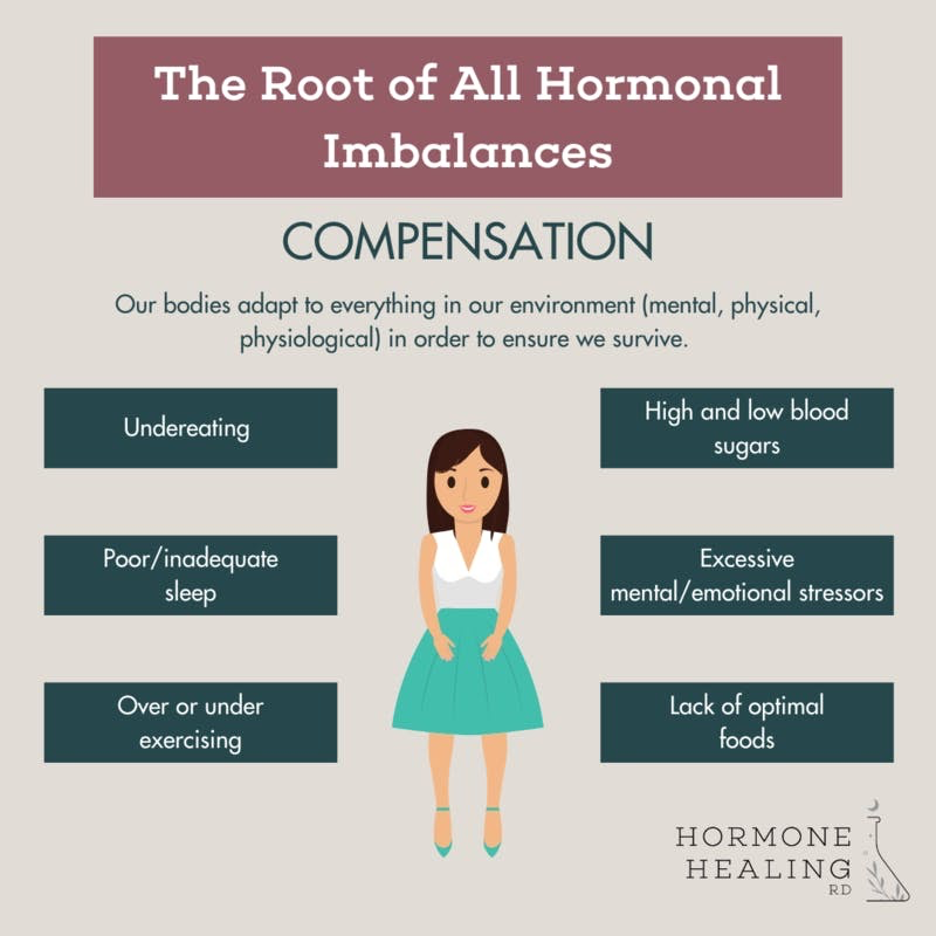I get a lot of questions about how to balance hormones. While it is helpful to have specific lab results, information from cycle tracking, and a food journal, what’s also important is to understand where the heck hormone imbalance starts in the first place. Our bodies want to be healthy and in homeostasis (balance), but it’s hard to do that when we live in a crazy world. It’s usually not just one thing that causes a hormone imbalance. It is as if our bodies are already compensating so much that eventually, they can no longer adapt.
What are the major contributors to compensation?
These are the most common contributors that I see adding up and eventually leading to compensation in the body:
Our bodies try to compensate and make up for these things by releasing our stress hormone, cortisol, which leads to us being in a chronically stressed-out state. When the body is in a stressed state, it does not prioritize hormone production or digestion and puts increased demand on the thyroid. For this reason, the symptoms arise. When our bodies are in this stressed state for too long, here’s what happens:

What are the foundations for hormone healing?
If we look at the image above, it’s clear what causes compensation AKA stress in the body. Undereating, poor/inadequate sleep, over or under-exercising, and mental/emotional stressors all impact cortisol levels. Excessive levels push the body into a state of fight or flight. Our bodies work so hard to keep us alive and responding to stress that this often leads to dysfunction down the road. So how do we combat this? What are the absolute basics when it comes to healing our hormones and getting out of a compensated state?
The two main areas of focus for setting this foundation is balancing blood sugar and managing cortisol levels. We get the body of this state by first focusing on blood sugar balance. When our blood sugar drops too low, the body responds by releasing cortisol, which tells our liver to release glucose to raise our levels again. This isn’t necessarily a bad thing, but if we are having this happen multiple times throughout the day, this will contribute to putting us in that compensated state. It’s also much more likely to occur at night and lead to very poor sleep and difficulty staying asleep. That’s why focusing on this first is a fantastic way to support your hormone health and pull you out of that constant fight or flight mode.
How do I balance my blood sugar?
1. Balance your meals with protein, fat, and carb. Yes, it is that simple. It doesn’t matter how frequently you eat if you aren’t balancing your meals, so make sure you start with this step. The amount of fat, carb, and protein depends on your unique needs. I’ll be talking about using body temp, pulse, and other signs from your body to figure this out in a future online workshop.
2. Eat every 3-5 hours. If you are in a constant fight or flight state, have low body temperature (less than 97.8F waking), and/or struggle with fatigue, I recommend eating more frequently (closer to the 3-hour mark). If you don’t struggle with those issues and have healthy periods, try 4-5. Most struggling with hormone problems need 3-4, though. I like to do 3 regular-sized meals and 2-3 small snacks that are still protein, fat, and carb.
3. Avoid eating protein or carbs alone. If the body needs carbohydrates, it will take protein and turn it into carbs via a process called gluconeogenesis. Although this is not an efficient process, the body will still resort to this when necessary—this is why eating protein alone can spike your blood sugar.
How do I achieve a healthy cortisol pattern?
1. Follow the instructions for blood sugar balancing above. This is something you have control over and will get you feeling better right away.
2. Eat within 30-60 minutes of waking up. Cortisol is naturally the highest in the morning and then goes down throughout the day, reaching its lowest point at night. While we want high cortisol in the morning, we don’t want to exacerbate this by putting off our first meal/snack. If you have a poor appetite or have difficulty getting out of bed, this step is especially crucial for you. Even if you have a few bites of something first thing (balanced, of course) that will help manage cortisol levels. Personally, I make a smoothie and drink half first thing and a half later in the day for a snack.
3. Moderate your blue light exposure to match the sun. Blue light tells our bodies that it’s day time, which increases cortisol levels. Blue light is not bad, but we want to minimize it as much as possible once it’s dark outside. I use blue light blocking glasses once the sun goes down and turns off as many lights as possible. You can use code HPP to get 15% off. I use the orange ones at night that block all blue light (unlike most pairs). You can even get prescription lenses, which is what I did.
We are all well aware that stress has detrimental effects on the body. Being in a constant state of stress causes our bodies to compensate, leading to an imbalance of our hormones. But fear not, balancing your blood sugar and creating healthy cortisol patterns is your cure. My Master Your Minerals course focuses on balancing your hormones through mineral balance and metabolic health. If you are ready to take charge of your hormones and health, sign up today! Also, check back for my next blog post where I discuss how to tune your metabolism for easier hormone healing.
